What is bingo? Bingo is a timeless game that has been enjoyed by people of all ages for decades. Whether played in bingo halls, community centers, or online platforms, it provides an exciting and social gaming experience. But what exactly is bingo? Let’s take a closer look at the basics of this classic game.
Key Takeaways:
- Bingo is a game of chance that involves matching numbers on a scorecard with those drawn by the game host.
- Players aim to create winning patterns, such as straight lines or specific shapes, on their scorecards.
- The game has evolved over the years, with different variations and patterns that can be played.
- Bingo provides social interaction and can be used as an educational tool.
- It is important to adhere to age requirements and legal considerations when playing bingo.
The Origins and History of Bingo
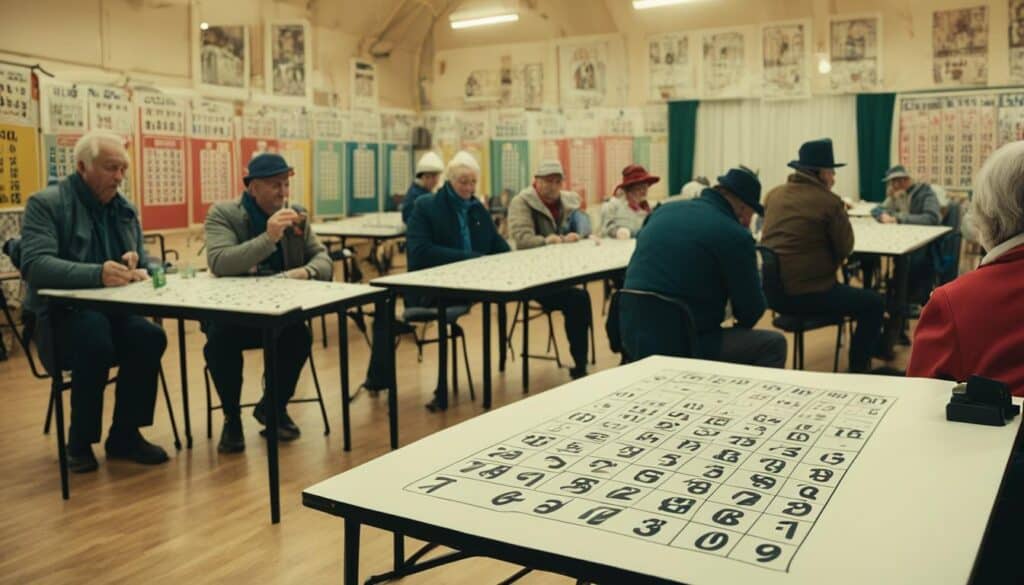
The game of Bingo has a fascinating history that dates back to the 16th century. It is believed to have originated in Italy as a lottery-style game known as “lotto.” The game quickly gained popularity and spread to other European countries, including Germany and France. Interestingly, Bingo was initially used as an educational tool in schools to teach various subjects such as mathematics, spelling, and history.
However, it was in the early 20th century that Bingo evolved into the game we know today. In the United States, Hugh J. Ward standardized the game and published a rule book, while Edwin Lowe mass-produced Bingo and introduced it to the public. The popularity of Bingo skyrocketed, and it became a beloved pastime for people of all ages.
“Bingo is a game of chance in which each player matches numbers printed on different cards with numbers chosen by a game host. The first player to match a specified pattern wins the game and calls out ‘Bingo!'”
The name “Bingo” itself has an intriguing story. It is said that during one game, a player accidentally yelled “Bingo” instead of “Beano” when they achieved the winning pattern. This slip of the tongue led to the adoption of the name “Bingo” for the game, and it has stuck ever since.
Throughout its history, Bingo has undergone various modifications and adaptations. Different versions of the game have emerged, such as the popular 75-ball Bingo in the United States and the 90-ball Bingo in the UK. Bingo has also found its place in the digital world, with the rise of online Bingo platforms offering a virtual gaming experience.
Overall, the history of Bingo reflects its evolution from a simple Italian lottery game to a worldwide phenomenon enjoyed by millions today.
How to Play Bingo
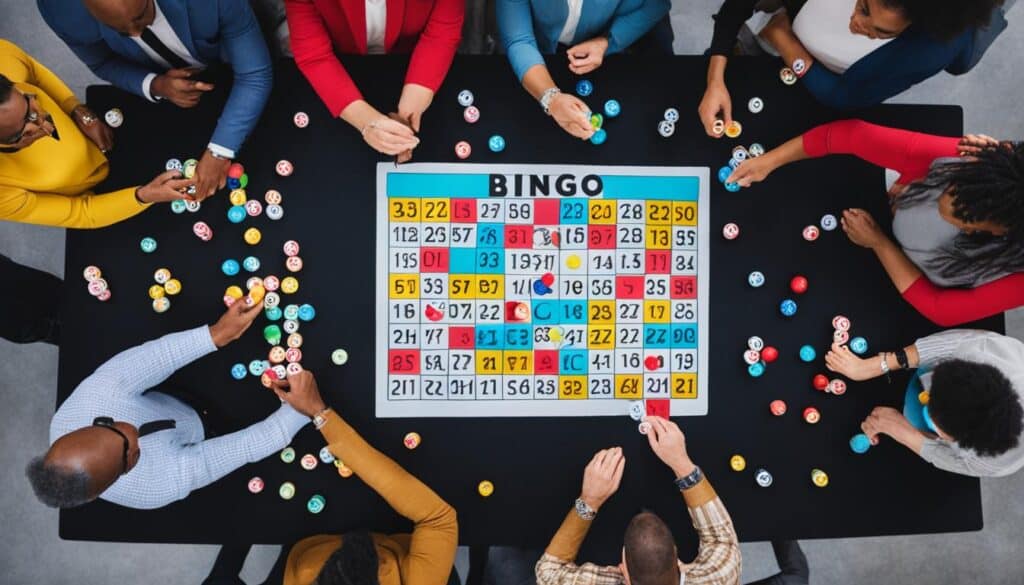
Playing Bingo is a straightforward and enjoyable game that can be quickly learned by beginners. To start, each player receives a scorecard with a grid of numbers arranged in multiple rows and columns.
The game host, also known as the caller, randomly selects numbers and announces them to the players, either by drawing numbered balls from a machine or using a deck of calling cards. As the numbers are called, players check their scorecards for a matching number.
If a player has a matching number, they cover it with a chip or a marker. The goal is to create a winning pattern on the scorecard, which can be a straight line horizontally, vertically, or diagonally, or a specific shape or pattern, depending on the variation of the game being played.
Once a player achieves the winning pattern, they must call out “Bingo” to signal their victory. The game is then paused, and the caller verifies the player’s winning card to confirm the win.
Playing Bingo is a social and engaging activity that offers excitement and the chance to win prizes. Whether you’re playing at a bingo hall, community center, or online, the rules and objective of the game remain the same: be the first to create the winning pattern and call out “Bingo!”
Different Variations of Bingo
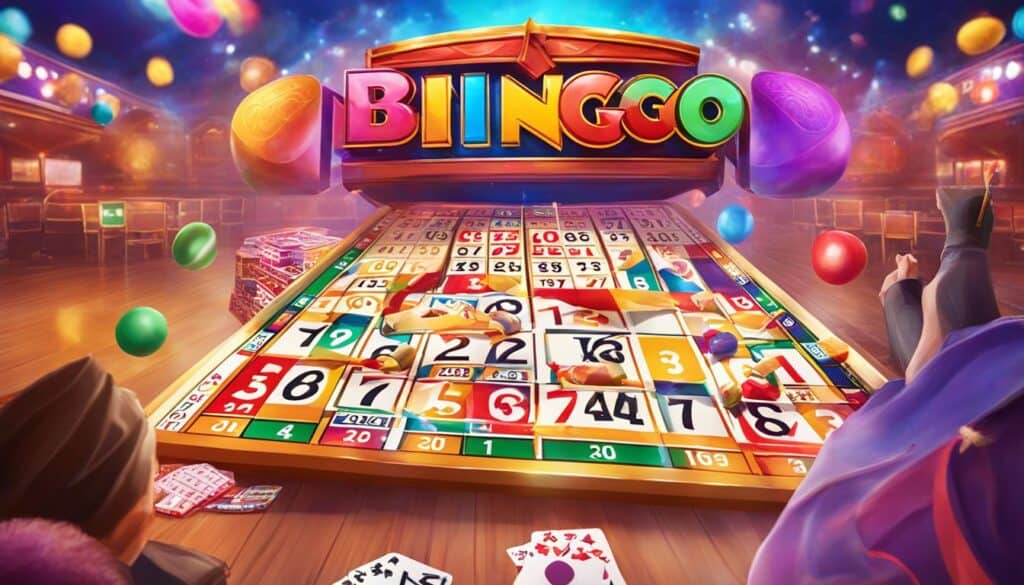
Bingo has evolved into multiple variations, with each jurisdiction’s gambling laws influencing how the game is played. In the United States, the most common variation is the 75-ball Bingo, where players aim to complete specific patterns on their scorecards. Other popular variations include:
- 90-ball Bingo: This variation is widely played in the UK and other parts of Europe. It consists of three stages: one line, two lines, and a full house. Players aim to mark off numbers in these three stages to win.
- 80-ball Bingo: This variant is often played online. It features a smaller 4×4 grid, with different patterns to complete, such as corners, diagonals, or full cards. It offers a faster-paced gameplay experience.
Additionally, players can encounter unique patterns in Bingo games. For example:
- Blackout: In this pattern, players aim to cover all the numbers on their scorecard, resulting in a “blackout” or “coverall.” It adds an extra layer of suspense and challenge to the game.
- Postage Stamp: This pattern requires players to mark off a 2×2 square of numbers, resembling a postage stamp. It offers a different strategic approach compared to traditional line-based patterns.
The variety of Bingo games and patterns adds excitement and keeps players engaged, catering to different preferences and gameplay styles.
Bingo Cards and Number Ranges
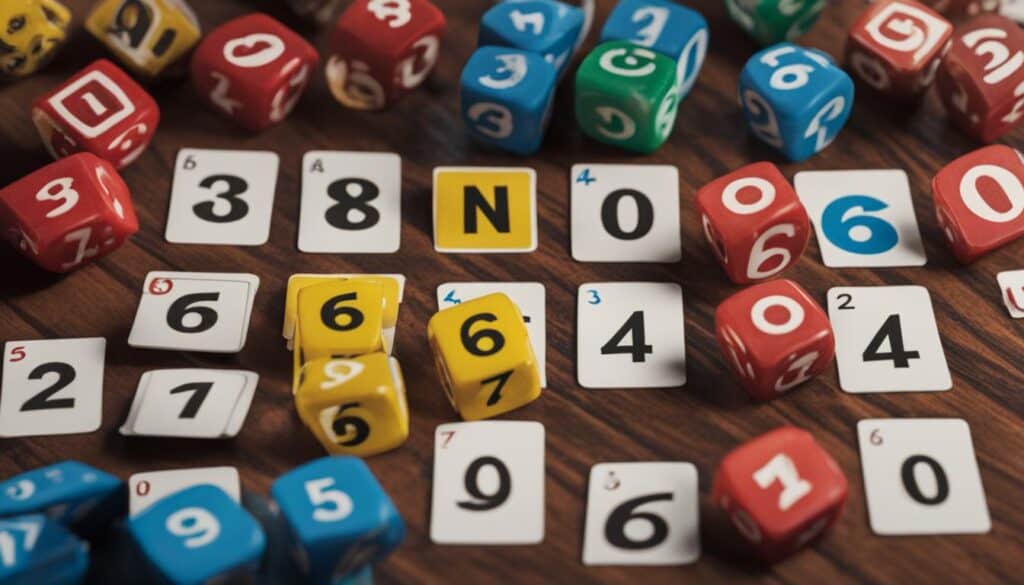
Bingo cards are an essential component of the game, providing players with a structured layout for marking numbers. Typically made of cardboard or disposable paper, bingo cards consist of 25 squares arranged in a 5×5 grid. The columns are labeled B, I, N, G, and O, representing sets of numbers.
In the standard 75-ball Bingo, each column corresponds to a specific range of numbers. The B column contains numbers 1-15, the I column features numbers 16-30, the N column holds numbers 31-45, the G column presents numbers 46-60, and the O column consists of numbers 61-75. Additionally, the center square is commonly marked as a “free” space, which counts as a covered square for any pattern.
This layout ensures a balanced distribution of numbers across the card, creating a fair and exciting playing experience. Players must pay attention to the number calls and mark off the corresponding squares on their cards to increase their chances of winning.
Chances of Winning in Bingo

The chances of winning in Bingo depend on several factors, such as the number of players and the number of cards being played. With more players and fewer cards in play, the odds of winning increase. However, Bingo is primarily a game of luck, as the numbers are called randomly. Each Bingo game has a winning card, ensuring that someone will win. Playing multiple cards can improve your chances, but ultimately, the outcome is determined by chance.
While there are strategies like playing with multiple cards or choosing less crowded game sessions that may slightly increase your chances, it’s important to remember that Bingo is still a game of luck. The random nature of the numbers means that everyone has an equal opportunity to win. So, whether you play with one card or ten, the probability of winning remains the same.
Regardless of the odds, Bingo can be an exciting and enjoyable game where players can experience the thrill of anticipation with each number call. So, relax, have fun, and enjoy the social aspect of playing Bingo with friends, family, or other enthusiasts!
The Role of the Caller in Bingo

In a game of Bingo, the caller takes on a vital role. It is the caller’s responsibility to select and announce the numbers that players need to mark on their scorecards. They play a crucial part in ensuring the smooth running of the game and maintaining its fairness.
There are different methods that the caller can use to generate the ball calls. One common method is the use of a mechanical ball blower, where balls with numbers on them are released and randomly selected. Another method is using a shuffled deck of Bingo calling cards, where the caller manually picks out cards and announces the numbers. Additionally, electronic random number generators (RNGs) can be employed to ensure that the numbers called are random and unbiased.
During the game, the caller must ensure that the numbers are announced clearly and audibly so that all players can hear and mark their cards accordingly. They need to have a clear and articulate voice to avoid any confusion among the players. It is the caller’s duty to keep the game on track, ensuring that it progresses smoothly and efficiently.
When a player claims to have a winning arrangement of numbers on their scorecard and calls out “Bingo,” the caller is responsible for verifying the winning card. They carefully check the marked numbers against the announced numbers to ensure accuracy. This process is crucial to maintain the integrity and fairness of the game.
The caller’s role in Bingo is essential in creating an enjoyable and engaging experience for all participants. They serve as the link between the players and the game, ensuring that the numbers are chosen impartially and the rules are followed. Without the caller, Bingo would not be possible!
Bingo as a Social and Educational Activity
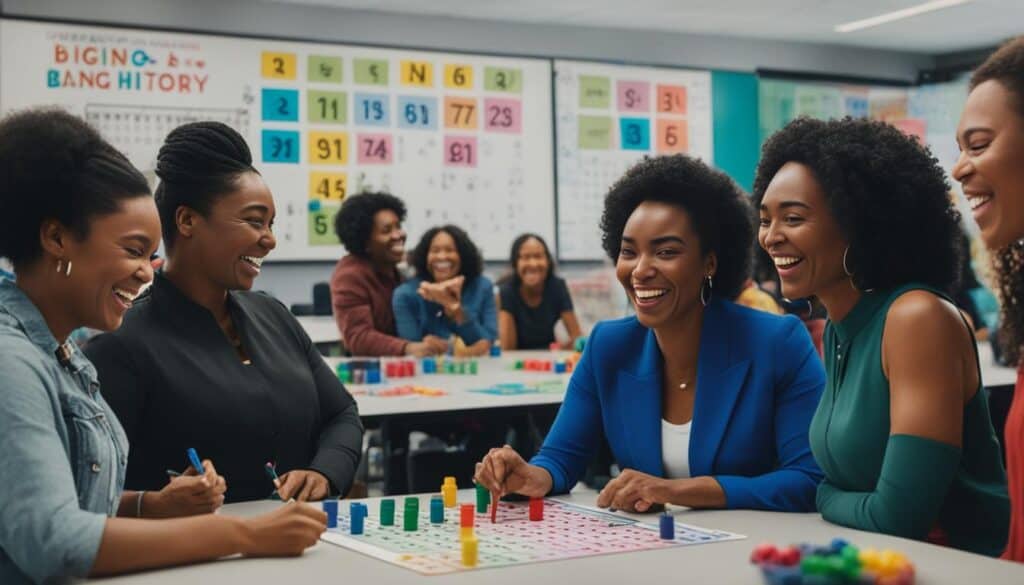
Bingo goes beyond being just a game, it serves as a platform for social interaction and brings people together. Many individuals find enjoyment in playing Bingo at bingo halls or community centers, where they have the opportunity to connect with other players and build lasting relationships. This social aspect of Bingo enhances the overall experience and creates a sense of camaraderie among participants.
Additionally, Bingo has found its way into educational settings, being utilized as a valuable teaching tool in schools around the world. Educators have recognized the benefits of incorporating Bingo into the classroom, particularly for teaching English language skills. Teachers and parents can create customized Bingo cards with educational content, such as sight words, vocabulary, pictures, or math problems. By incorporating learning into the game, Bingo becomes a fun and engaging way for students to enhance their knowledge and retention.
Bingo’s educational potential extends beyond language acquisition. It can be adapted to various subjects and concepts, enabling students to practice and reinforce their understanding in an enjoyable manner. Whether it’s learning history, geography, or even science, Bingo can be tailored to suit different topics and age groups.
Furthermore, the social and educational aspects of Bingo intersect, creating a dynamic environment that fosters collaboration and teamwork. When played in groups, Bingo encourages communication and cooperation among participants, as they work together towards a common goal.
Overall, Bingo offers numerous benefits as both a social and educational activity. It brings people together, promotes social interaction, and provides a platform for learning in a fun and engaging way. Whether you’re enjoying the company of fellow players at a bingo hall or using Bingo as a tool for education, the social and educational aspects of this game make it a truly enriching experience.
Bingo as a Business and Charity Activity
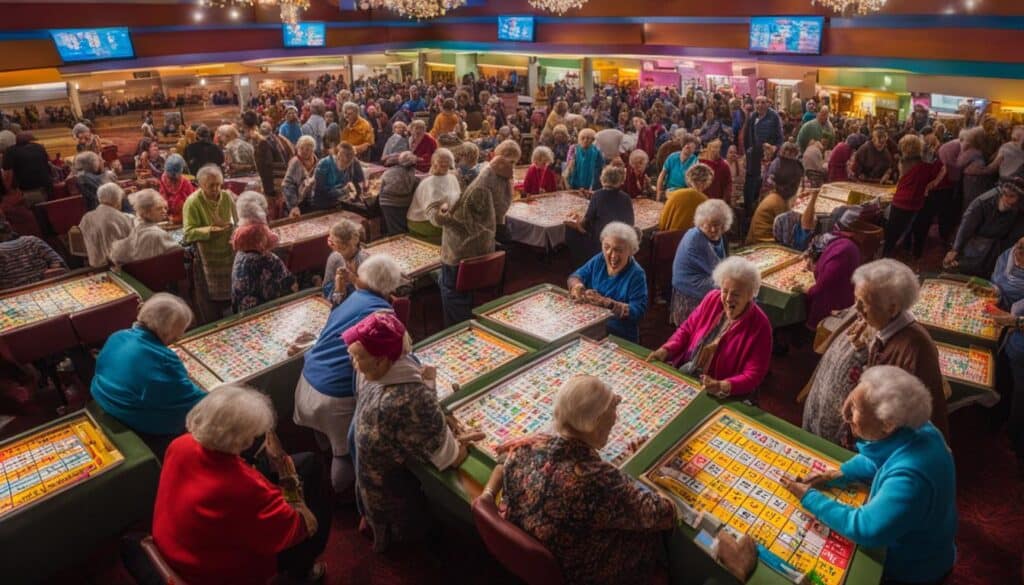
Bingo is not only a game of chance, but also a popular activity for fundraising and entertainment. Churches, charity organizations, and commercial entities often organize Bingo events to support charitable causes and bring communities together. In the United States, many churches and charity groups hold regular Bingo nights to raise funds for their respective causes.
Bingo halls can also be rented out to organizations that want to host their own Bingo events. This provides an opportunity for businesses and non-profit organizations to engage with their audience, raise awareness for their cause, and generate funds.
It is important to note that the stakes and legality of Bingo games vary depending on state regulations. Some states allow only non-profit organizations to host Bingo games, while others may have different restrictions and licensing requirements.
Bingo as a fundraising activity has proven to be an effective way to support charitable causes. Not only does it provide entertainment for participants, but it also creates a sense of community and camaraderie. The funds raised through Bingo can make a significant impact in supporting various initiatives and programs.
Playing Bingo Online

With the advancement of technology, Bingo has also moved into the online realm. Many websites and mobile apps offer online Bingo games that can be played from the comfort of one’s home.
Online Bingo provides convenience and accessibility, allowing players to enjoy the game anytime and anywhere. It also offers various options for different game variations, such as traditional 75-ball Bingo, 90-ball Bingo popular in the UK, and 80-ball Bingo often played online.
One of the advantages of online Bingo is the availability of chat rooms, where players can socialize and interact with other participants. These chat rooms create a sense of community among players and enhance the overall gaming experience.
Another benefit of online Bingo is the ability to play multiple cards simultaneously, increasing the chances of winning. In traditional Bingo halls, players are limited to the number of cards they can physically manage, but online platforms allow for easy management of multiple cards with just a few clicks.
Virtual Bingo Experience
“Online Bingo has gained popularity, especially among those who prefer the convenience of virtual gaming.”
Moreover, online Bingo platforms often feature attractive graphics, sound effects, and animations that enhance the overall visual and auditory experience. These virtual enhancements add to the excitement and entertainment value of the game.
Whether players are looking for a quick game during their lunch break or a late-night session from the comfort of their homes, online Bingo caters to their needs. The convenience and accessibility of internet Bingo have expanded its reach and attracted a wider audience.
Overall, online Bingo provides a modern and convenient way to enjoy this classic game. With its wide range of game variations, social interaction features, and the ability to play multiple cards simultaneously, online Bingo offers a unique and engaging experience for players of all ages.
Bingo Strategies and Tips
While Bingo is largely a game of chance, there are a few strategies that players can employ to enhance their experience and potentially increase their chances of winning. Here are some tips and winning strategies in bingo:
- Play with multiple cards: One of the most common tips is to play with multiple bingo cards. By having more cards in play, you increase your chances of marking off numbers and achieving a winning pattern. However, make sure you can manage multiple cards effectively and keep track of the numbers being called.
- Play at less crowded times: Another strategy is to play bingo at less crowded times. When there are fewer players, the competition is lower, and your odds of winning may increase. This allows you to have a better chance of being the first to complete a winning pattern on one of your cards.
It’s essential to remember that while these strategies may increase your chances, bingo is ultimately a game of luck. No strategy can guarantee a win, as the numbers are called randomly. Enjoy the game and embrace the excitement of the unexpected outcomes!
Bingo Etiquette and Social Norms
When playing Bingo in a social setting, it’s important to follow certain etiquette guidelines. Proper behavior in bingo halls contributes to a positive and enjoyable experience for all players. Here are some key points to keep in mind:
- Arrive on time: Being punctual shows respect for the organizers and other players.
- Respect the rules: Familiarize yourself with the specific rules of the bingo hall or event and follow them accordingly.
- Be quiet and attentive: Maintain a calm and quiet atmosphere during the game. Listen carefully to the caller’s announcements to avoid missing any numbers.
- Avoid distractions: Keep electronic devices on silent mode and refrain from engaging in loud conversations or disruptive behavior that may distract other players.
- Congratulate winners: When a player wins, it’s customary to congratulate them with a polite applause. Avoid causing unnecessary noise or disruptions that might disturb ongoing games.
- Maintain a friendly atmosphere: Be mindful of your words and actions, treating fellow players with respect and courtesy. Avoid negative or confrontational behavior.
Remember, bingo is meant to be a social activity where people come together to have fun. By following proper conduct and observing bingo etiquette, you contribute to a harmonious and enjoyable environment for everyone involved.
Now that you’re aware of the etiquette and social norms in bingo, let’s explore the many benefits of playing this classic game!
The Benefits of Playing Bingo
Playing Bingo offers several benefits beyond mere entertainment. It can help improve cognitive skills, such as concentration, memory, and hand-eye coordination. When players actively listen to the numbers being called and mark them on their scorecards, it enhances their ability to focus and maintain mental agility.
Bingo also provides social interaction, which plays a crucial role in boosting mental well-being and combating feelings of loneliness. Whether playing at a local bingo hall or engaging in online bingo communities, players have the opportunity to connect with others, form friendships, and create a sense of belonging.
Moreover, many people find joy and excitement in playing Bingo, which can have a positive impact on mood and overall happiness. The thrill of marking off a winning number or achieving a particular pattern can evoke feelings of accomplishment and satisfaction.
So, whether you’re a seasoned player or new to the game, consider the various benefits of playing Bingo beyond the potential monetary rewards. It’s an activity that can stimulate your mind, foster social connections, and bring joy to your life.
Age Requirements and Legal Considerations in Bingo
The age to play Bingo can vary depending on the jurisdiction. In the United States, the legal gambling age for participating in Bingo games typically ranges from 18 to 21 years old, depending on the state. It is crucial for players to comply with these age restrictions to ensure they are playing within the legal boundaries.
Bingo is categorized as a form of gambling, and therefore, it is subject to specific laws and regulations in each jurisdiction. These regulations may include licensing requirements for organizers, restrictions on cash prizes, and rules regarding the operation and conduct of the game. It is important for players to familiarize themselves with these regulations to avoid any legal issues.
Furthermore, players should be aware of the potential consequences of engaging in illegal gambling. In some cases, individuals who participate in Bingo games while underage or in violation of local laws may face penalties, including fines or legal repercussions. It is the responsibility of players to educate themselves on their local regulations and play Bingo in accordance with the law.
To ensure a safe and legal playing experience, it is recommended that players consult their local state gambling commission or regulatory authority for accurate and up-to-date information on the legal gambling age, Bingo regulations, and any other requirements or restrictions in their area.
FAQ
What is Bingo? The Classic Game Explained.
Bingo is a game of chance that involves matching numbers on cards with those called out by the game host. When a player achieves a winning pattern, they call out “Bingo” to claim a prize.
What is the history of Bingo?
Bingo has a rich history dating back to the 16th century. It originated in Italy as a game called “lotto” and spread to other European countries. In the early 20th century, it became popularized in the United States by Hugh J. Ward and Edwin Lowe.
How do you play Bingo?
Each player is given a scorecard with numbers, and the game host randomly selects and announces numbers. Players mark their cards when a called number matches one on their scorecard, with the objective of creating a winning pattern.
What are the different variations of Bingo?
There are various Bingo game variations, including 75-ball Bingo, 90-ball Bingo, and 80-ball Bingo. Each variation has different rules, patterns, and ways to win.
What is the layout and number range of Bingo cards?
Bingo cards have 25 squares arranged in a 5×5 grid. The columns are labeled B, I, N, G, and O, with specific number ranges assigned to each column.
What are the chances of winning in Bingo?
The chances of winning in Bingo depend on factors such as the number of players and cards being played. While playing multiple cards can improve chances, Bingo is ultimately a game of luck.
What is the role of the caller in Bingo?
The caller is responsible for selecting and announcing numbers to players. They ensure fair play and verify winning cards when a player calls out “Bingo.”
What are the social and educational aspects of Bingo?
Bingo brings people together and can be used as an educational tool. It promotes social interaction and can help improve cognitive skills.
How is Bingo used for business and charity activities?
Bingo is often used for entertainment and fundraising purposes by churches, charity organizations, and commercial entities. It helps support charitable causes and brings communities together.
Can I play Bingo online?
Yes, there are various websites and mobile apps that offer online Bingo games. Playing online provides convenience, game variety, and the ability to play from anywhere.
Are there any strategies or tips for playing Bingo?
While Bingo is primarily a game of luck, players can increase their chances by playing multiple cards and choosing less crowded times to play. However, there is no guaranteed strategy for winning Bingo.
What is the etiquette and proper conduct when playing Bingo?
Players should arrive on time, be respectful, and maintain a friendly atmosphere. It is important to listen attentively to the caller and congratulate winners without causing disruptions.
What are the benefits of playing Bingo?
Playing Bingo can improve cognitive skills, provide social interaction, and enhance mood and happiness. It offers a positive and enjoyable experience for players.
What are the age requirements and legal considerations in Bingo?
The age requirements to play Bingo vary by jurisdiction. In the United States, the legal gambling age is usually 18 or 21, depending on the state. Players should adhere to local regulations and understand the consequences of illegal gambling.
 Online Gaming Circuit
Online Gaming Circuit




